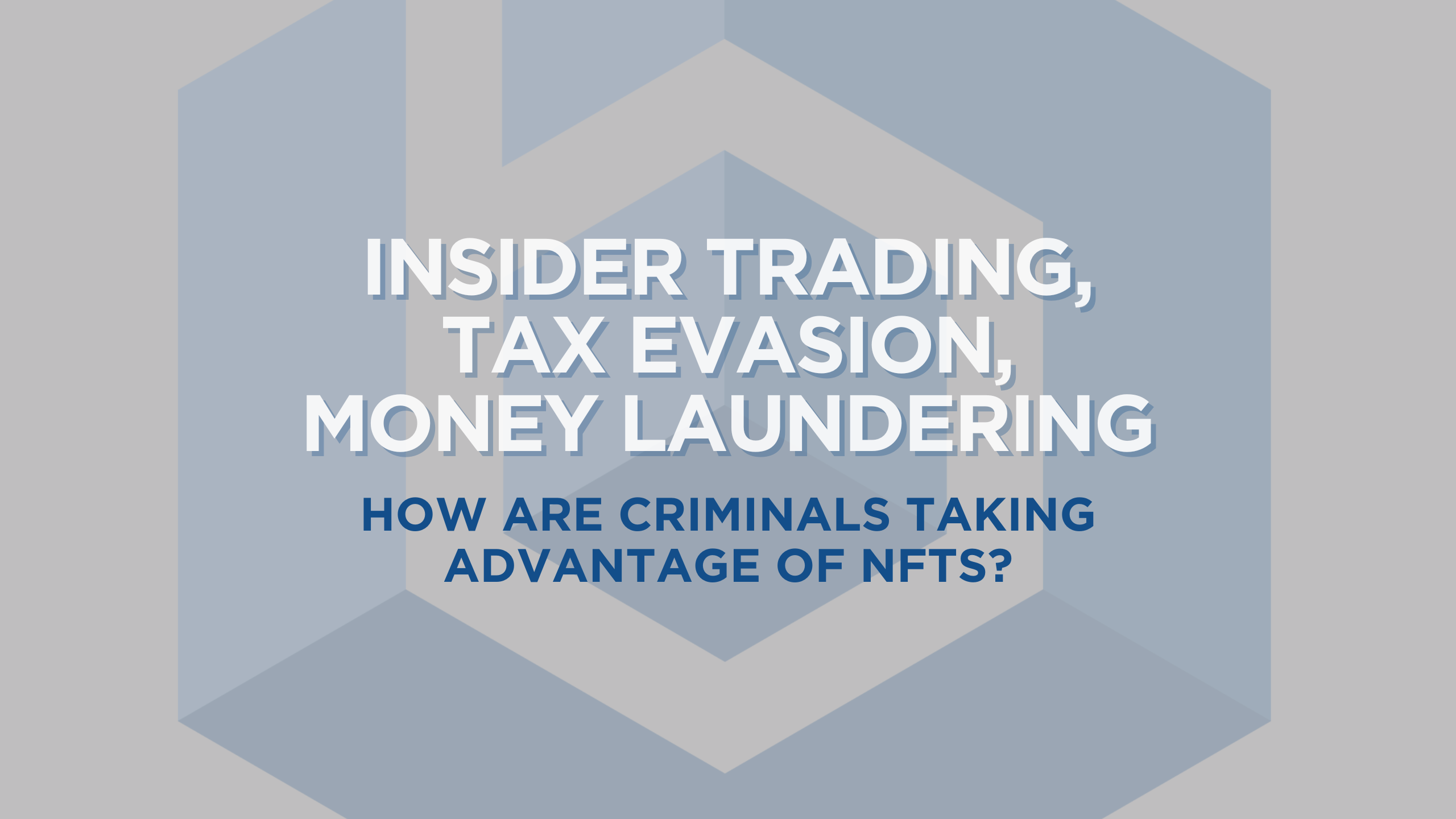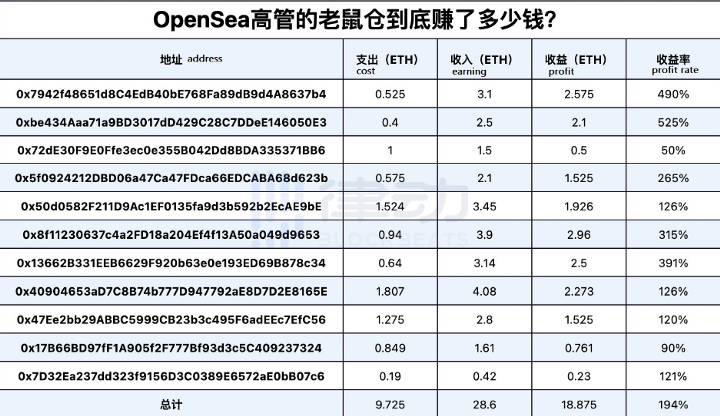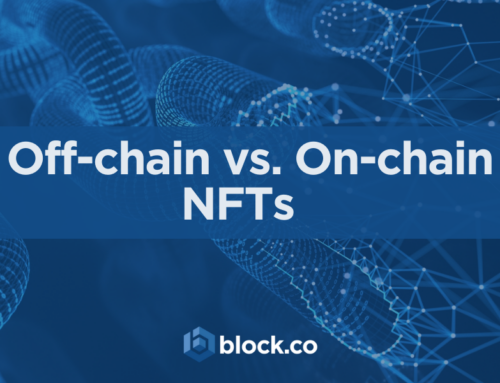NFTs (Non-Fungible Tokens) and Criminal Activity

Written by George Agathangelou
NFTs continue to dominate the news with both good and unwelcome news coming up daily. In this article, we will see how criminals take advantage of innovative technology and NFTs to commit crimes, whether it is insider trading, tax evasion, or money laundering.
Insider Trading
On the 1st of June 2022, an OpenSea employee was charged with wire fraud and money laundering in the first case of digital asset insider trading over NFT (Non-Fungible Token) purchases by the United States Attorney’s Office, according to a press release. The Department of Justice says Nathaniel Chastain used his position as a product manager at OpenSea – one of the most popular marketplaces for NFTs – to buy the NFT before it appeared on the site’s home page, taking advantage of insider knowledge.
“OpenSea kept confidential the identity of featured NFTs until they appeared on its homepage…”. “After an NFT was featured on OpenSea’s homepage, the price buyers were willing to pay for that NFT, and for other NFTs made by the same NFT creator, typically increased substantially.” the press release says. The report also mentions that between June and September 2021, Chastain bought several NFTs before they were displayed on the site’s home page, and then sold them for 2x-5x the original purchase price. In an effort to hide the sales, Chastain used an anonymous wallet and an OpenSea account to make the NFT trades.
U.S (United States). Attorney Damian Williams mentioned that “Nathaniel Chastain betrayed OpenSea by using its confidential business information to make money for himself. Today’s charges prove the commitment of this Office to stamping out insider trading – whether it occurs on the stock market or the blockchain.”
So, let’s see exactly what took place on the blockchain in this case:
Data compiled by a bitcoin news account in China claimed that Chastain made 19 Ethereum – around $67,000 at the time – in the alleged insider trading scheme. https://twitter.com/btcinchina/status/1438041142306623491?s=20&t=t_Cy9ap-Xska6cKde9uCWg

Running the first 5 addresses on a blockchain monitoring tool, we can see that the funds were being transferred to wallet address 0xa3a4548b39da96eb065ff91811ca30da40431c0d (https://etherscan.io/address/0xa3a4548b39da96eb065ff91811ca30da40431c0d), that holds more than 156.69 ETH as of the time of writing, including Cryptopunk #3501 (https://opensea.io/assets/0xb47e3cd837ddf8e4c57f05d70ab865de6e193bbb/3501), belonging to the profile https://opensea.io/natechastain
Incorporating all the addresses below shows a distinct pattern of transfers to wallet 0xa3a4548b39da96eb065ff91811ca30da40431c0d of Open Sea former executive Nate Chastain. (https://twitter.com/natechastain)
- 0x7942f48651d8C4EdB40bE768Fa89dB9d4A8637b4
- 0xbe434Aaa71a9BD3017dD429C28C7DDeE146050E3
- 0x72dE30F9E0Ffe3ec0e355B042Dd8BDA335371BB6
- 0x5f0924212DBD06a47Ca47FDca66EDCABA68d623b
- 0x50d0582F211D9Ac1EF0135fa9d3b592b2EcAE9bE
- 0x8f11230637c4a2FD18a204Ef4f13A50a049d9653
- 0x13662B331EEB6629F920b63e0e193ED69B878c34
- 0x40904653aD7C8B74b777D947792aE8D7D2E8165E
- 0x47Ee2bb29ABBC5999CB23b3c495F6adEEc7EfC56
- 0x17B66BD97fF1A905f2F777Bf93d3c5C409237324
- 0x7D32Ea237dd323f9156D3C0389E6572aE0bB07c6
OpenSea admitted it in an announcement in its Mea culpa moment
“Yesterday we learned that one of our employees purchased items that they knew were set to display on our front page before they appeared there publicly.
This is incredibly disappointing. We want to be clear that this behavior does not represent our values as a team. We are taking this very seriously and are conducting an immediate and thorough third-party review of this incident so that we have a full understanding of the facts and additional steps we need to take. We have also implemented the following policies:
OpenSea team members may not buy or sell from collections or creators while we are featuring or promoting them (e.g., on our home page); and
OpenSea team members are prohibited from using confidential information to purchase or sell any NFTs, whether available on the OpenSea platform or not.”
Digging a bit deeper into wallet 0xa3a4548b39da96eb065ff91811ca30da40431c0d, we can see connections to Tornado Cash after 5 hops, without this meaning necessarily further illicit activity; it indeed raises some further suspicion, however, it’s not the aim of the present article.
This situation also proves the following:
“What occurs on the blockchain, doesn’t always stay at the blockchain.”
NFT sphere participants have tipped off the government and OpenSea about the potential wrongdoing, after verifying that the defendant was using “burner” wallets to buy the NFTs before their launch on OpenSea. Those sophisticated crypto avengers analyzed the defendant’s wallet interest and posted tweets revealing the suspected crime. This is a mere instance of self-monitoring and policing inside the crypto community, while regulators are still playing the cat and mouse game and staffing their units with crypto investigators.
This also reminds us of the need for the verifiability of an open public blockchain, allowing transactions that are available for all to see. Time will tell if posts through state-of-the-art self-policing “blockchain detectives” becomes a reference point for law enforcement in the new web3 paradigm.
Money Laundering and Tax Evasion
One of the fundamental issues of the scrutiny of NFTs by regulators is that art, in general, is subjective. Art has been used for illegal money flow for years, and in the case of NFTs, people could use the money made from illegal acts to purchase NFTs, which is a legitimate action. In this way, illegal funds may be spent on NFTs through a trusted third-party account or a “burner” wallet, and then the NFT is sold for nothing to bank the profits.
For example, a red flag would be to see a network of parties who send and receive the same NFTs, to each other. Additionally, it could be NFTs being sold for substantial amounts and then reacquired by the same people or group of people for smaller amounts. Lastly, another signal would be to have frequent transactions when NFTs are overpriced or underpriced significantly from the floor price.
Let’s break down an example to see the inner workings of tax evasion through art NFTs. Let’s consider a millionaire making a profit of $10 million in 2021. The millionaire is looking for ways to avoid paying taxes, so he hires an artist to make art for $20 thousand. The artist concludes his artwork for the payment, and the millionaire then has the artwork “appraised” for $10 million. The millionaire then gracefully donates the multimillion-dollar artwork (that cost $20 thousand…) to a museum, in order for him to receive a $10 million tax write-off. As a result, the millionaire has no tax obligation for the year and got away with paying $20 thousand for the artwork (and the appraiser’s fee), while the rest of us plebs are sitting and wondering why these expensive artworks are valued at these ridiculous prices…
There are various criminal activities associated with NFT trading, including money laundering, insider trading, and tax evasion. To the extent that stakeholders such as decentralized exchanges, minting platforms, and regulators are not proactive in finding and mitigating such risks, the industry is yet to reach maturity and be taken more seriously. For example, decentralized NFT marketplaces still do not obtain KYC (Know Your Customer) information on users, allowing the activities described in the article to be repeated. On the bright side, it seems that regulators are finally starting to pay attention to this first NFT case heading to court. As BLOCK.CO we are aware of the issues and have eloquently designed our platform to mitigate legal issues and risk factors for our clients. We advocate for brands to give away their NFTs instead of selling them to make a quick profit. We advocate for the creation of real-life utility of NFTs through the best possible engagement with their communities, towards an honest, legitimate, and open Metaverse.
If your brand is ready to take the step into web 3.0 and NFT marketing, to optimize engagement with your audience in innovative ways, then click the button below to get your Free Trial, a limited number of Free NFTs, and a Free Consultation call from our team!
To get more information about Block.co’s services, please contact Block.co directly or email at enquiries@block.co.
Tel +357 70007828
We regularly post educational materials on our social media, follow us to stay up to date about the latest blockchain and NFT news.
Resources:
https://nonfungible.com/news/corporate/bad-behaviors-nft-blockchain
https://amycastor.com/2021/03/14/metakovan-the-mystery-beeple-art-buyer-and-his-nft-defi-scheme/







